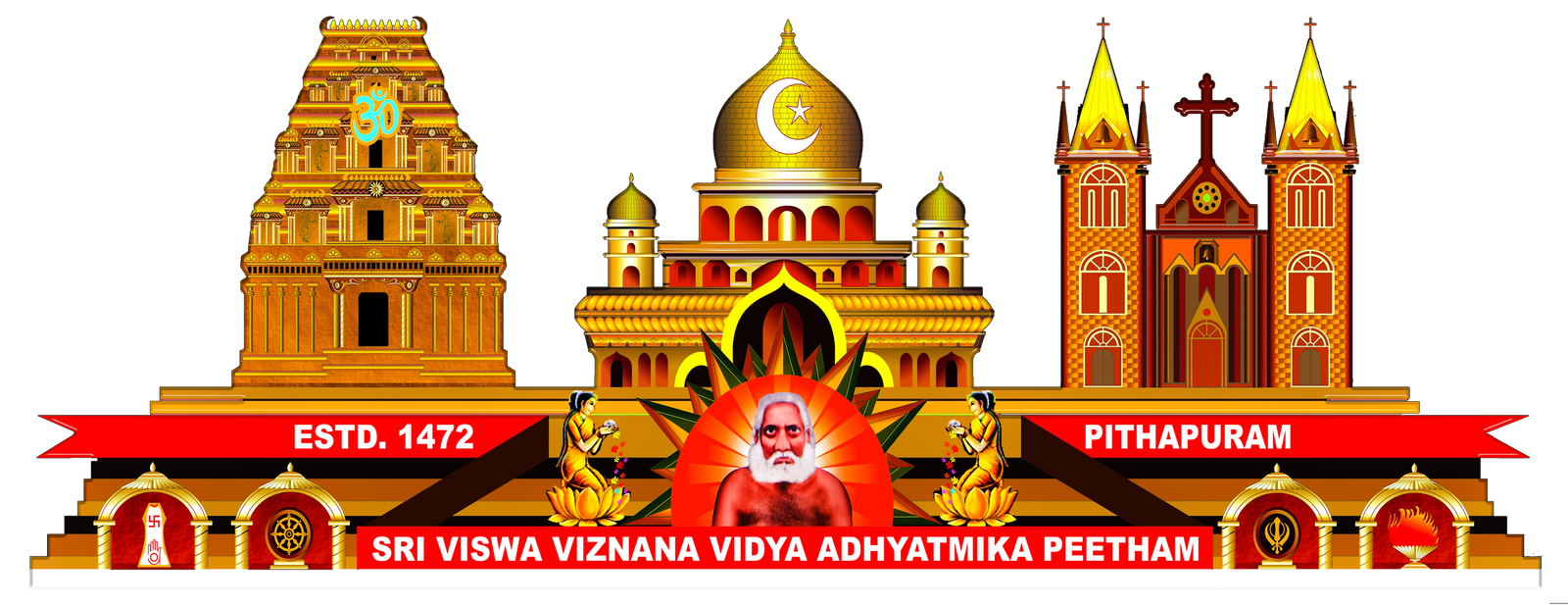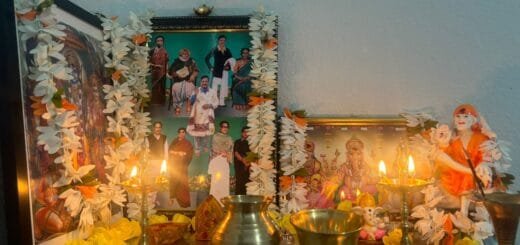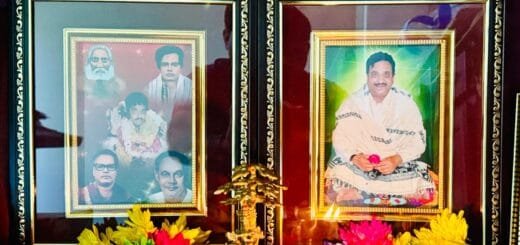Sha Philosophy – Chapter27: JEEVAHIMSA (TORTURE OF THE SOUL)
Some preachers of Dharma ( basic principles of the spiritualism ) have written books on the rules for righteous living and preach them to their disciples that,
. The method of realizing the Supreme Knowledge is known as penance.
. It is to be practised in the form of Sadhana ( spiritual contemplation ).
. To do spiritual practice, the Sadhaka ( seeker ) should give up cruelty and unkindness.
. The Sadhaka should show bosom friendliness and mercy towards every living being and become gentle.
. The food of Sadhaka, who practises penance, should be gentle ( bloodless ), i.e. his food habits should not cause any harm to the life of anything that has life.
. So, the penitent should change his life style and eat gentle food alone.
Because of the anguish to attain salvation through the Supreme Knowledge and also as per the directive of his Master, the disciple gives up his traditional food habits like eating fish and meat, even though they are peculiar to his own caste. Though he has had those habits for many years and still he has the urge, with great difficulty he tries to discontinue his old food habits and endeavors to contemplate the Supreme Soul. He resolves within himself that, unless such food habits are given up God won’t appear to him. However when he is among his relatives during marriage parties etcetera, when he notices the delicious dishes made of fish and meat and attracted by their aroma, as his longing ( urge ) to eat such traditional food does not leave him, he will be perplexed and frustrated. Because of such a vexation, he inflicts immense torture to his own life ( soul ). Though, he is aware of his plight, as per the directive of his Guru ( Master ), and by keeping his Master’s preaching in view, with great difficulty he eats vegetables ( vegetarian food ) during such social functions to project himself to be a great penitent in the view of his kith and kin. In addition to this, he preaches that, “ No penitent should torture any life ( soul ). Unless the penitent performs his spiritual journey in a gentle way like this ( without eating fish and meat ) , he cannot attain salvation. Even there is the sightest deviation from the aforesaid gentle food habits; the Sadhaka’s penance will be broken. He loses the salvation from the cycle of births and deaths. The stain of his sins will lead his soul to take rebirths in the form of mean lives by disallowing it to cease the never-ending cycle of births and deaths and ruin it. This is the reason why every man, who tortures other life forms, is not able to become fit to realize the Supreme Knowledge. Such persons will take rebirth in the form of a low creature and perish. Therefore, everyone should give up Jeevahimsa ( Torture of the Soul )”. In addition to this, he boasts that, unlike others he won’t perish, going to comprehend the Supreme Knowledge and attain salvation. By listening to his words, his co-participants of those social functions like marriage parties etcetera may mistakenly consider him to be a great soul who could apperceive God and venerate him and salute to him .We may come across such persons on various occasions and experience the above things.
By observing such a person , contrary to the above, some people may say,
“ History reveals that, Brahmins and other social groups were initially eating fish and meat , but subsequently they stopped. Though they have stopped eating dishes made of fish and meat, they don’t show any desire to eat them because, wherever they go to attend parties, vegetarian dishes are available. But this man, who claims himself to be a penitent and a pet of his Master, as he has been eating non-vegetarian food ( made of fish and meat ) for a long time, now how can he claim that his taste for such a food is gone, is it not silly! But for now, the vegetables he eats like brinjal ( garden egg), cucumber etc also contain life. When these vegetables are pulled off from their mother plants and cut into pieces, the torture , those vegetables suffer is much more painful than this Jeevahimsa ( killing of animals for food ). There are people , who stopped eating dishes made of fish and meat and later on they resumed their old habit, because they could not resist their “ longing to eat “. In reality such persons stop eating fish and meat by considering it to be a sin, however as they cannot forget the pleasant-taste of such a food , they start eating it again by forgetting that it is Jeevahimsa ( torture of life )”. In addition to the above , other people who are also present at the banquet, may laugh at such a person with disregard and taunt him by saying, Lord Krishna mentioned about such persons in Bhagavad-Gita that, “ Those , who consider and stop certain action to be sinful and perform the same again, their sin will become doubled”.
In view of the respect shown towards these penitents by the society as above and to understand the real meaning of Jeevahimsa, let us separate this word jeevahimsa. The word Jeeva ( life ) is an equivalent word ( synonym ) to Atma ( soul ).
Lord Krishna said about soul in Bhagavad-Gita that,
Ya enam vetti hantaram yaschainam manyate hatham ubhow thow navijaneeto na yam hanthi nahanyathe”
Meaning : Soul neither kills nor is killed. Souls do not have death. Cannot be, killed by others, hated by others and abused by others . They are perpetual entities
Therefore, Soul neither kills nor is killed; those who think otherwise are erring. The ascetics , who had renounced the world and left the habit of eating fish and meat to comprehend the Supreme Knowledge, are not able to examine the aforesaid words of Lord Krishna to understand what is Jeeva ( Soul ).
The soul is subtle. It is divine. It pervades the entire Universe that consists of innumerable Cosmic Globes. Such a soul, as is in the form of life ( vital energy ), embodies to live in this world as some animated being. To such a soul, these so-called Masters, Preachers and Jnanis ( wise men) are attaching this word Himsa ( torture ). So, let us not be snared by such guile talks.
Now, let us follow the old saying of Aryans, “ Ye tathvishaye tathpurvam pracheenam ( before that, what was the ancient thinking )”to understand the true meaning of the word “ jeevahimsa”, which is being used by these ascetics. If we critically examine our scriptures, it is said that, an animal ( goat )is required to be sacrificed during performing Yagna ( fire sacrifice ); its meat is to be roasted in the Homagunda ( pit of sacred fire) known as Balipheeta ( altar), and eaten by soaking it in fermented toddy ( palm wine ). Somehow, if the reserved animal for that Yagna ( fire sacrifice ) is lost, in place of that, an expiatory sacrifice of a well grown handsome young boy of sixteen years of age is to be performed on that altar.
Slokam:
Praayaschittam mahaadhyeta naram va pursharshabha
Anayaswam, pasum sreeghram yavatkarma pravartite
At the beginning of Ramayana it was written that, while the Aadipurusha ( forefather) of Raghu dynasty, Emperor Ambreesha was performing Yagna, the reserved animal for that Yagna had disappeared. Then the sage who was chosen as Brahma ( main priest ), directed him to perform an expiatory sacrifice, which consists of slaying a well grown , healthy handsome young man on that altar. In this Kaliyug ( eon of Kali), while giving witness at judicial courts, Hindus take oath on Ramayana. The above presented sloka is from such a holy Ramayana. In the same Ramayana it is written that, the Guru ( Master ) of the Raghu dynasty, the great Sage Vasishta slaughtered a virgin cow and gave feast to sage Durvaasa to show his hospitality when he came to visit his hermitage. A wicked man named IIIwala slaughtered his brother Vataapi ( a wicked juggler, who has transformed himself into a goat by means of a conjuring trick ), cut his body into pieces and with that meat he made fried rice ( pulao ) and offered to sage Agasthya to show his hospitality. Sage Agasthya ate that food, which contained the meat of Vattapi and gently caressed his own belly with his right hand by saying “ Vataapi jeernam, ( may Vataapi be digested )”, then Vataapi was digested.
A critic of Ramayana pointed out in his article that, Lord Sri Rama and Devi Seeta also ate fish and meat. When Hanuman ( monkey lord ) reached Lanka in search of Devi Seeta, he saw her sitting under an Asoca ( Jonesia Asoca ) tree in a garden named Asoca Vana. Hanuman secretly climbed over that tree and dropped the wedding-ring of Lord Sri Rama on to Devi Seeta’s lap to draw her attention. Then Devi Seeta looked upwards and saw that monkey sitting on that tree.
Though she had recognized that ring, which belongs to her husband Lord Sri Rama, as she didn’t know that Lord Sri Rama had the support of monkeys, she presumed that the demon king Ravana himself came in the disguise of a monkey and created a ring similar to that of Lord Sri Rama by a conjuring trick to deceive her. Therefore, she didn’t believe in the words of Hanuman and perplexed. As Hanuman understood the situation and spoke to her convincingly by saying, “ Oh Mother, I am a servant of Lord Sri Ram. My name is Hanuman; your husband has given up drinking of Palmyra wine and eating of meat owing to the grief of your separation and longing for your love”. Then she believed in the proof he had presented to her by speaking out the private affairs about Lord Sri Ram that, he had given up the habit of drinking of wine and eating of meat which he liked next to his wife”. Then she believed Hanuman to be the trusted servant of Lord Sri Ram and spoke openly to him because he spoke of the private family matters of Lord Sri Ram.
Ravanabrahma was one of the grandsons of Prajapati ( one of our first forefeathers ) Pulasthya Brahma. When Hanuman went to Lanka in search of Seeta, while describing Ravana’s kitchen he described about the pots filled with liquor ( wine ) and lumps of meat. We can find a number of such descriptions even in our scriptures like Mahabharata and Bhagavata. Today the eating of fish and meat is treated as Jeevahimsa ( torturing of soul ), however in the view of the critic, the habit of eating of fish and meat has not reached the level of prohibition by any sage, incamate or any author of Upanishads ( Sacred texts of Hinduism of a mystical nature dealing with metaphysical questions ).
History reveals that in the present eon of Kali, an Andhra emperor named Madhavavarma had performed Narayaaga ( human sacrifice ). In which he had slaughtered 18 numbers of handsome young men of Andhra on an altar known as Yagna.
From this it is very clear that unless rituals such as these Yagnas are performed , it is impossible to acquire the company of beautiful courtesans, like Rambha and Urvasi of Elysium.
Lord Krishna said in Bhagavad-Gita that,
S/o. Naaham vedairna tapasaa na daane na chejyayaa
Sakhya yevam vidho drashtum drushtavanasi maam yadhaa.
Neither by study of Vedas, nor by rituals like Yagnas, is it possible to comprehend Supreme Wisdom!
It is written that even Lord Buddha the founder of Buddhism, which propagates mercy and compassion on living beings, ate shrimps and pork after he had completed his discourses.
He preached clearly in his doctrines to his disciples that, whenever they go for collecting alms, if any householder offers meat, they should eat without any hesitation. Similarly it is evident from the literature that, even Jesus Christ ate meat.
In the light of the aforesaid reasons, it is evident that, there is same magnitude of Jeevahimsa ( torture of life )even in the eating of vegetables as compared to that of meat and fish. All of us know that, the vegetables are the products from plants, which are also living things. When they rot we find worms in them . Therefore, it is evident that, in this world everything has life.
In view of the aforesaid facts, if we examine, it is improper to say eating of meat and fish alone is Jeevahimsa ( torture of life ) and eating of vegetables isn’t Jeevahimsa.
In this world a big fish swallows a smaller fish. Wild animals ( Beasts ) eat away other animals. Among animals, the mightiest one is the elephant. It is a herbivore. The lion, known as the king of beasts is a carnivore. If we feed the lion with leaves and grass, it does not suit it. Similarly the feeding of meat does not suit the elephant. It is necessary for human beings to maintain their own food habits, which are peculiar to their castes and traditions. So, the food habits should not hinder the process of learning the Supreme Wisdom.
Mai khuro masahabbe sojo
Aatashandar, kaa bajas,
Saakine, but khaa na baashad
Mardu maa jaari makun.
You may drink wine, you may eat meat, you may burn kaba masjid ( mosque ) under intoxication of wine, you may tear out the holy Quran, you may worship idols against your religious doctrine, even then you may be forgiven by the God, when you cognize such deeds were wrong and repent before the God. But, the God will never forgive when you torture the Soul ( heart ) of any man,
. Who has that great Miraculous Brilliant Divine Energy originated from God embodied as his soul or
. Who has the power to manifest that Miraculous Brilliant Divine Energy within his soul and could become Swayambrahma ( transformed himself into that Divine Light of God ).
Those who torture such great Divine souls, will fall into the hell and continue to receive torture or eternal punishment in it till the end of the Kalpa ( creation or time ).
Even though a man may commit vilest sin that renders his soul to go into one of the most dreadful hells, if he repents before God, he will be forgiven, but there is no excuse to those, who tortures the innocent human souls ( hearts ). Prophet Mohammad said, indeed such a person will never be forgiven. Therefore, the aforesaid act itself is to be trated as “ Jeevahimsa ( torture of soul )”.
In reality, there is life in every substance. Nothing qualifies to become food unless it has life in it. No living being can survive in this world unless it kills some other life from for food in the form of Jeevahimsa ( torture of life ) so; leave the wrong notions about Jeevahimsa ( torture of life ). In true sense Jeevahimsa ( torture of life ) is causing grief to the other man’s soul ( heart ). Therefore; I wish, you should never cause grief to the other man’s soul, to lead your life meaningfully in a gentle way, so that you will never get the sin of Jeevahimsa ( torture of Soul ).
Notes:
- Brahmin is a member of the highest of the four Hindu Varnas, the Brahmin category is the priestly or sacerdotal category. In Hinduism Varna is the name for the original social division of Verdic people into four groups:






